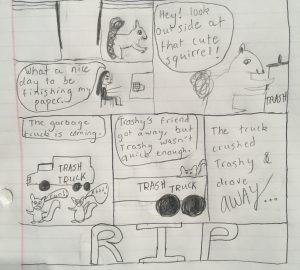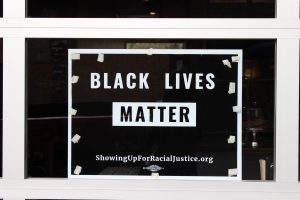Our discussion on Thursday is what inspired this blog post. It’s kind of a personal, memoir type piece that I couldn’t get out of my head once it was in, because I have had a very personal experience pertaining to time and how it messed with me for a very long time (and still kind of continues to, but not to the level it used to). Writing about it felt weirdly relieving. It’s kind of long, be warned.
I wasn’t very young when my parents divorced. Ten years old, it was just old enough for my dad leaving to impact me profoundly, especially after a childhood of anxiety and constantly being terrified that the people in my life would leave me. One of my greatest fears came to life the night he decided he couldn’t live with us anymore.
Time became important to me, an essential part of my life.
After he moved out, somehow my brain started to think that it was only a matter of time before my mom left too. That couldn’t happen.
My dad moved to a house literally about a four minute drive from my house, which is not far by any means. I was happy for this, and I willingly visited him every Saturday with my brother for our court mandated visits. From 9am to 5pm, it was routine. I would wake up at 8, get ready and my mom would drop the two of us off just on time.
“See you guys at five!” My mom would tell us, give us a kiss and once she made sure we were safely inside, she would drive off.
The day itself would go by easily, filled with domestic activities or fun trips. The only catch in my mind was we had to be back home by 4:30 so that if mom was early we wouldn’t keep her waiting. If she wasn’t, which she never was, it would be okay because then I could spend the next half an hour eagerly awaiting her arrival, trying to ignore the doubts in my head.
What if she never comes back?
Nonsense. You’re being ridiculous. She said she would be back at five, so she will be.
4:45
Only fifteen minutes left, I double checked my bag and made sure I had everything. I double checked my brother’s bag and made sure he had everything.
4:50
I start to imagine what we’re going to do for the night. Will mom take us to get some DVDs so we can have a movie night? Will she have groceries filled with snacks? Did she make our favorite vegetable soup for dinner? Did she go on any fun adventures today?
4:55
Five minutes left! My heart rate always picked up at this point, a mix of anxiety and excitement to see her face and go home. At this point I was fully ready to leave, standing on the landing just outside my dad’s second floor apartment, staring out at the street and waiting for her car to appear.
I know my dad was always behind me, watching me with concern as he knew the likelihood of her coming exactly at 5:00 like I expected was low, and preparing himself for the outcome.
5:00
Sure enough, she didn’t show up. The thoughts immediately intruded.
5:00:10
Oh god, where was she? Alright, it’s fine. You’re fine. She’s going to come.
5:00:30
Calm down.
5:00:55
Almost a minute, she’s still not here. Where is she? Why am I being like this, it’s not like she’s going to come right at-
5:01
At this point I was picking up the shitty $99TTD cell phone that my mom got me to use solely for calls to her. Dialing the extremely familiar number, waiting for her to pick up. The 50/50 chance of her either picking up or not had my heart pounding.
Most of the time she wouldn’t answer.
The logical, and usually accurate explanation for this would be because she was driving, or her phone was on silent. Sometimes she was just ignoring me, knowing my tendencies to freak out unnecessarily.
The weight of the time passing every minute past 5:00, had my chest hurting and my heart beating at speeds I was sure were unhealthy.
“A waiting pot never boils,” My dad told that to me once, and I had to ask him what he meant, “It means that when you wait for something to happen, it will feel as though it’s taking much longer.”
The explanation didn’t help me at all, but for some reason I always thought of it. Was I messing up cosmically by waiting for her? Were my incessant calls, voice mails and text messages pushing her away from me? Was the universe out to hurt me by making her show up late, or even not at all? Did the universe want to spite me by making me wait longer?
5:10
Where is she?!
At this point usually the tears would start as I paced the floor of my dad’s living room, waiting for her to call back. The worst scenarios ran through my head, awful images that I would see sometimes in my dreams. Car crashes. A plane flying away, with her in it. Any possible ‘wrong place wrong time’ scenario. My dad would tell me things, I would never really hear what he was saying in my frenzy. I wouldn’t let him try to hug me, I didn’t want to be consoled, I wanted my mom. She might be gone.
5:20
I’ve stopped moving, the only thing I’m capable of doing at this point is curling up on the floor with the phone in my hand trying to regulate my breathing after feeling like I was about to pass out.
My dad is still trying to help me, my brother just looks confused as he stands there, not understanding the potential implications of what her being twenty minutes late might mean.
5:22
My phone rings, I shoot up and frantically press the green button to answer.
“Mom?” I asked shakily. I hear her sigh on the other end.
“I’m outside, honey,” She tells me, and I instantly feel dumb for ever thinking she would leave. My reddened cheeks get slightly redder with the embarrassment, but it’s all overshadowed by the relief I feel knowing she’s right outside.
This happened for months, almost everywhere I went, effectively ruining my 6th grade social life and making it so that it was almost impossible for me to leave my mom’s side if she wasn’t back right when she said she would be. Time was all the mattered, because when she was away from me doing whatever she had to do, time seemed to be the only thing I could count on. I didn’t realize how dependent I was on it until therapy, and even after I’m still painfully aware of it most of the time.
Time affecting the psyche brought back a lot of memories, not particularly good ones, but I’m being honest when I say that writing this actually helped. And hey, now I can look back on that time knowing that I’m now in university, thousands of miles away from my mom in Egypt, and I’m pretty fine.
Interesting, how time was my worst enemy, best friend, and now after all this time, I’ve gotten much better.
Does that make sense?



